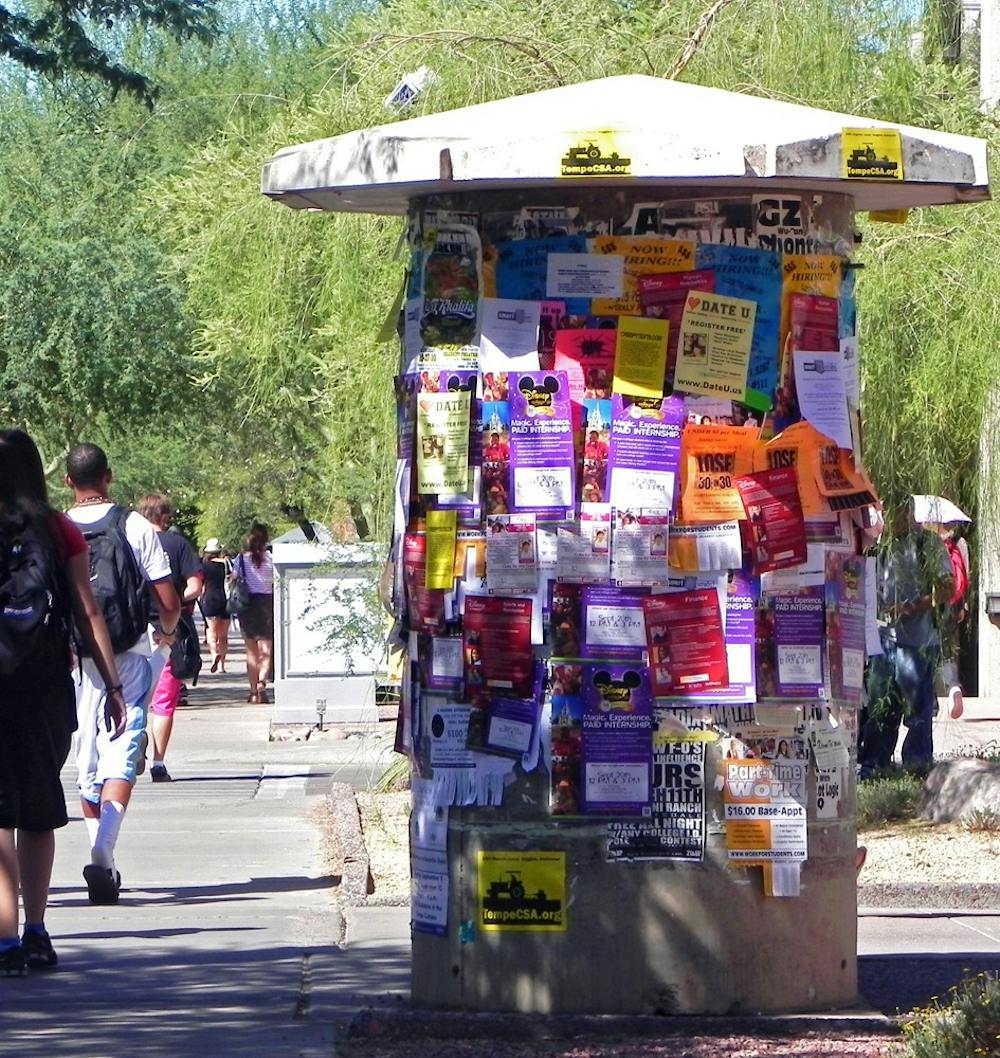Colorful flyers are layered on the concrete kiosk in the middle of Orange Mall on Arizona State University’s Tempe campus.
Loose papers flutter on the ground.
“Campus organizations are permitted to post two notices per kiosk, and off-campus organizations are permitted to post one notice per kiosk,” say the student organization advertising rules on the Memorial Union website.
It’s clear no one follows this rule.
According to Eliza Robinson, marketing specialist at the Memorial Union, they don’t have to. Though the policy references off-campus organizations, Robinson says it only serves as a guide to student organizations.
The multiple concrete structures (formally called advertising kiosks) that house flyers, posters and brochures in prominent places around ASU campuses are commonly covered in multiple copies of papers produced by a variety of organizations, from on-campus religious groups to off-campus bars.
The bars, at least, seem to be breaking another rule against “the promotion of excessive use of alcohol.”
However, it doesn’t seem to matter.
As the kiosks are in a public space, there is only so much they can do to regulate them, Robinson says.
The first rule online of advertising and posting on the kiosks is: “All advertising must be factual, and should not mislead or misrepresent the real nature of event, activity, service, or commodity advertised.”
A large percentage of the flyers on the kiosks advertise high-paying jobs with low-effort requirements and tear-off phone numbers at the bottom. Often, a majority of the slips are torn off.
ASU Career Services Officer Elaine Stover doesn’t think this means ASU students are actually following up on these job offers.
“I think most students are probably savvy enough where they know that if something sounds too good to be true, it probably is,” Stover says.
For ASU computer science and math junior Ethan Holshouser, this was the warning bell that led him to research the tantalizing jobs he saw on the kiosks. After seeing the flyers posted everywhere, he decided to look more into the job prospects.
“Most of them say you can make money by doing something like envelope stuffing,” he says. “However, if they were a legitimate organization they could get that done at Staples or pay an intern to do it for a fraction of what they claim you can make doing it at home.”
The flyers often advertise salaries well above minimum wage, from $15 to $25 an hour.
Multiple examples of the advertised businesses offering work for students ask for an upfront fee for informative literature about the job.
“If there’s any fee involved ahead of time, that’s a no-no,” Stover says. “That goes without saying. ”
As Holhouser researched, upfront fees often involve scams, but occasionally they do provide actual work.
“I figured that they probably just take your money and you never hear from them again, but I did some research on the Internet and apparently a lot of them actually do want you to stuff envelopes,” Holhouser says.
Stover says certain jobs like ones that require certification, such as teaching, require legitimate upfront fees — other than that, they’re scams students should avoid.
Holshouser compares the jobs to pyramid schemes: business models that rely on other people signing up to make others money.
He thinks businesses target ASU students because they are more desperate for work as well as less experienced.
“Also, campus bulletin boards are free to use and get seen by thousands of people every day, whereas most other advertising formats with similar exposure cost significant amounts of money and are more likely to attempt to weed out scams,” he says.
Contact the reporter at smwester@asu.edu.






